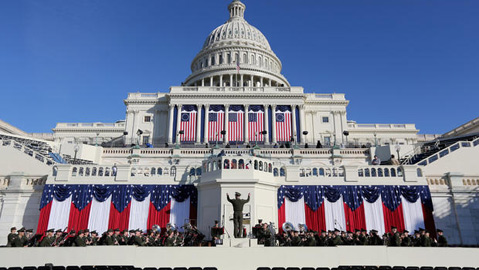Fear and Loathing on the Trump Trail
Find Out What Happens When Reporters Stop Being Polite, and Start Getting Real

The same day many Santa Barbara women were frantically canceling their plane tickets to Washington D.C. after Hillary Clinton’s shocking loss, I found myself booking a flight to the capitol for the frenzied weekend.
No, I’m not a closet Trumpette. I primarily wanted to write about the Women’s March on Washington set for January 21. A colleague encouraged me to go soak up the energy. Whatever happened was sure to be historically beautiful.
But I was also curious about a Donald Trump inauguration. Would he really assume the appearance of a statesman? Would his supporters really look like the rednecks and bikers that many of us in the liberal bubble of Santa Barbara imagine them to be?
As one of the few female staff writers at the Santa Barbara Independent, women’s issues — sexual assault, abortion, equal pay — often fall on my lap simply because I have a vagina. I welcome the chance to explore such topics.
After all, my good friends are among those who volunteer at the Rape Crisis Center, post in “Pantsuit Nation,” endlessly listen to Beyoncé (okay, so do I), and do not hesitate to bravely call out guys who slip into objectifying women. I am lucky to know them.
But I must be honest: I don’t usually find myself quite as outwardly furious. I feel too even-keeled. Growing up, my mother was never very politically engaged. She came of age in the early 1970s, but she didn’t burn her bra or grow out her armpit hair. She rarely disclosed whom she voted for. But she certainly taught me to be a strong woman, unapologetically truthful, and never fearful.
I see myself, though, primarily as a reporter. For three and a half years, I have felt as though it is my job to remain as neutral as humanly possible. So when I find myself talking to those with whom I flatly disagree, I bite my tongue. I nod, and hope my eyebrows aren’t lifted an inch higher or my jaw dropped two inches lower.
Yet as I listened to Trump’s Education Secretary nominee Betsy DeVos claim that her personal experience was immaterial to the post she sought, I rolled my eyes. How could one’s experiences not impact their professional work? And why shouldn’t they?
I thought about the expectation of neutrality for journalists of all kinds. Readers share this with me in online comments, the dreaded “Message Via the Website” emails that clutter my inbox on Thursday mornings when the paper comes out, and even in line at the grocery store.
And I thought about the criticism I’ve received. Once a group of government bureaucrats formally declared my work “mostly balanced.” Or another time someone claimed I had been “reckless with the role I had been entrusted with.” (I won’t go there.)
I could argue until I’m blue in the face that good journalism is not always entirely balanced. It’s an analytical take on the facts at hand, right here, right now. Deadline pressure means mistakes are sometimes made. Current events are fluid, and as my journalism professor instilled in me, “Journalism is history’s first draft.”
As I sit on the plane, looking around at the people on board — a woman in “Hillary for President” baseball cap, women in the row behind me gleefully sharing their lives with strangers, a veteran who’ll perform in the Color Guard, a man in a red baseball cap that could be mistaken for a “Make America Great Again” hat — I realize I am going to Washington simply because I am curious.
But I’ve decided to take a few days off from being a “mostly balanced” reporter and write about my feelings toward the things I see and the people I meet. After all, in these uncertain times, I’d be lying if I pretended I wasn’t personally curious about the repercussions of a Trump presidency, and likewise, the potential invigoration of feminism.
I’ll post regularly, while keeping in mind a line in Hunter S. Thompson’s Fear and Loathing: On the Campaign Trail — “… everything was written under savage deadline pressure in the traveling vortex of a campaign so confusing and unpredictable that not even the participants claimed to know what was happening.”


